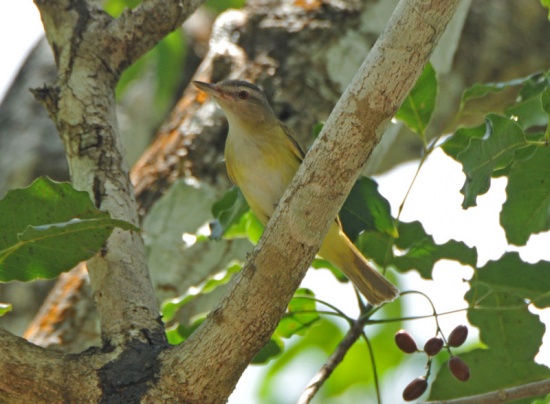(Attempt to disguise some copied text. References) |
|||
| Line 1: | Line 1: | ||
;[[:Category:Vireo|Vireo]] flavoviridis | ;[[:Category:Vireo|Vireo]] flavoviridis | ||
| − | [[Image:Yellow-green_vireo_by_Moaom.jpg|thumb|550px|right|Photo by | + | [[Image:Yellow-green_vireo_by_Moaom.jpg|thumb|550px|right|Photo by {{user|Peter+Withers|Peter Withers}}<br />[[Yucatán]], [[Mexico]] ]] |
| − | |||
==Identification== | ==Identification== | ||
| − | 14–14.7 cm | + | 14–14.7 cm<br /> |
| − | + | *Olive-green upperparts | |
| + | *Dusky-edged grey crown | ||
| + | *Dark line from the bill to the red-brown eyes | ||
| + | *White supercilium | ||
| + | *White underparts | ||
| + | *Yellow breast sides and flanks<br /> | ||
| + | '''Juveniles''' | ||
| + | *Duller | ||
| + | *Brown eyes | ||
| + | *Brown tint to the back | ||
| + | *Less yellow on the underparts | ||
==Distribution== | ==Distribution== | ||
Breeds from [[Mexico]] and [[Texas]] to central [[Panama]], mostly migrant with wintering grounds from [[Colombia]] and [[Venezuela]] south to [[Brazil]] and [[Bolivia]]. A few are probably present during any month in Panama<sup>[[#References|4]]</sup>. | Breeds from [[Mexico]] and [[Texas]] to central [[Panama]], mostly migrant with wintering grounds from [[Colombia]] and [[Venezuela]] south to [[Brazil]] and [[Bolivia]]. A few are probably present during any month in Panama<sup>[[#References|4]]</sup>. | ||
| − | |||
==Taxonomy== | ==Taxonomy== | ||
This species is considered a monotypic species by Clements<sup>[[#References|1]]</sup> while others recognize more subspecies: ''flavoviridis'', ''forreri'', and ''insulanus'' by Restall<sup>[[#References|2]]</sup> or not ''insulanus'' but instead ''perplexus'' in Avibase (probably from Dickinson<sup>[[#References|3]]</sup>). | This species is considered a monotypic species by Clements<sup>[[#References|1]]</sup> while others recognize more subspecies: ''flavoviridis'', ''forreri'', and ''insulanus'' by Restall<sup>[[#References|2]]</sup> or not ''insulanus'' but instead ''perplexus'' in Avibase (probably from Dickinson<sup>[[#References|3]]</sup>). | ||
| Line 15: | Line 23: | ||
Seems plastic in its habitat choice, mostly in open and semiopen areas when breeding in Panama<sup>[[#References|4]]</sup> but more in forest and semiopen areas in South America during winter<sup>[[#References|2]]</sup>. | Seems plastic in its habitat choice, mostly in open and semiopen areas when breeding in Panama<sup>[[#References|4]]</sup> but more in forest and semiopen areas in South America during winter<sup>[[#References|2]]</sup>. | ||
==Behaviour== | ==Behaviour== | ||
| − | The female builds a cup shaped nest from plant materials. | + | ====Breeding==== |
| − | + | The female builds a cup shaped nest from plant materials. The clutch consists of 2-3 white eggs with brown marks, which are incubated by the female. Both adults feed the young. | |
| + | ====Diet==== | ||
The diet includes insects gleaned from tree foliage, especially caterpillars and beetles, also small fruits, including mistletoe berries. | The diet includes insects gleaned from tree foliage, especially caterpillars and beetles, also small fruits, including mistletoe berries. | ||
| − | |||
==References== | ==References== | ||
# Clements, James F. 2007. ''The Clements Checklist of Birds of the World''. 6th ed., with updates to October 2007. Ithaca: Cornell University Press. ISBN 9780801445019 | # Clements, James F. 2007. ''The Clements Checklist of Birds of the World''. 6th ed., with updates to October 2007. Ithaca: Cornell University Press. ISBN 9780801445019 | ||
| Line 24: | Line 32: | ||
# Dickinson, Edward C. (ed.). 2003. ''The Howard and Moore Complete Checklist of the Birds of the World''. 3rd ed. Princeton: Princeton University Press. ISBN 9780691117010 | # Dickinson, Edward C. (ed.). 2003. ''The Howard and Moore Complete Checklist of the Birds of the World''. 3rd ed. Princeton: Princeton University Press. ISBN 9780691117010 | ||
# Ridgely & Gwynne 1989. Birds of Panama. Princeton Paperbacks. ISBN 0691025126 | # Ridgely & Gwynne 1989. Birds of Panama. Princeton Paperbacks. ISBN 0691025126 | ||
| + | #Wikipedia | ||
| + | {{ref}} | ||
==External Links== | ==External Links== | ||
{{GSearch|Vireo+flavoviridis}} | {{GSearch|Vireo+flavoviridis}} | ||
[[Category:Birds]][[Category:Vireo]] | [[Category:Birds]][[Category:Vireo]] | ||
Revision as of 22:43, 27 April 2010
- Vireo flavoviridis
Identification
14–14.7 cm
- Olive-green upperparts
- Dusky-edged grey crown
- Dark line from the bill to the red-brown eyes
- White supercilium
- White underparts
- Yellow breast sides and flanks
Juveniles
- Duller
- Brown eyes
- Brown tint to the back
- Less yellow on the underparts
Distribution
Breeds from Mexico and Texas to central Panama, mostly migrant with wintering grounds from Colombia and Venezuela south to Brazil and Bolivia. A few are probably present during any month in Panama4.
Taxonomy
This species is considered a monotypic species by Clements1 while others recognize more subspecies: flavoviridis, forreri, and insulanus by Restall2 or not insulanus but instead perplexus in Avibase (probably from Dickinson3).
Yellow-green Vireo was for a while considered conspecific with Red-eyed Vireo.
Habitat
Seems plastic in its habitat choice, mostly in open and semiopen areas when breeding in Panama4 but more in forest and semiopen areas in South America during winter2.
Behaviour
Breeding
The female builds a cup shaped nest from plant materials. The clutch consists of 2-3 white eggs with brown marks, which are incubated by the female. Both adults feed the young.
Diet
The diet includes insects gleaned from tree foliage, especially caterpillars and beetles, also small fruits, including mistletoe berries.
References
- Clements, James F. 2007. The Clements Checklist of Birds of the World. 6th ed., with updates to October 2007. Ithaca: Cornell University Press. ISBN 9780801445019
- Restall et al. 2006. Birds of Northern South America. Yale University Press. ISBN 9780300124156
- Dickinson, Edward C. (ed.). 2003. The Howard and Moore Complete Checklist of the Birds of the World. 3rd ed. Princeton: Princeton University Press. ISBN 9780691117010
- Ridgely & Gwynne 1989. Birds of Panama. Princeton Paperbacks. ISBN 0691025126
- Wikipedia
Recommended Citation
- BirdForum Opus contributors. (2024) Yellow-green Vireo. In: BirdForum, the forum for wild birds and birding. Retrieved 29 April 2024 from https://www.birdforum.net/opus/Yellow-green_Vireo




